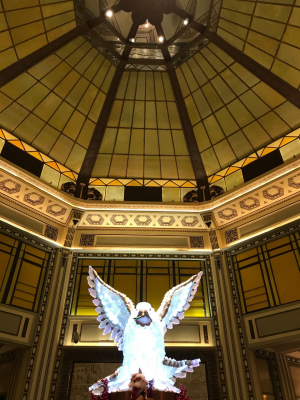tabbyさんの おぼえた日記 - 2021年2月11日(木)
この日記をフォローしているユーザ
この日おぼえたフレーズ(英語・中国語・ハングル)
おぼえた日記

今天是阴历的除夕。
除夕,为岁末的最后一天夜晚。(中略)岁除之日,民间尤为重视,家家户户忙忙碌碌或清扫庭舍,除旧布新,张灯结彩,迎祖宗回家过年,并以年糕、三牲饭菜及三茶五酒奉祀。
引用《百度百科》
除夕:故事背景
“年”是一种怪兽,会在没每年的最后一天从海里跑出来,袭击村庄。为躲避“年“的攻击,村民们不得不躲进山里。直到有一天,一位老人想出了一个好办法:他将红纸贴在门上,点亮红灯笼,让家里亮堂堂的,并穿上一件红外套,成功吓走了年兽。此后每年的最后一天,人们都会甜红纸、挂红灯笼、放鞭炮庆祝。
引用《冬春节日》
照片是和平饭店大厅的鸟(鹰?)
阴历[yīn lì] 陰暦 lunar calendar
除夕 [chú xī] 除夜、大晦日 New Year's Eve;
岁末 [suì mò] 年末 end of the year;
庭舍 [tínɡ shè] 家 house;
除旧布新 [chú jiù bù xín] 古いものを取り除き、新しいものを打ち立てる get rid of the old to make way for the new; do away with the old and set up the new; ring out the old, ring in the new; weed the old to bring forth the new;
张灯结彩 [zhāng dēng jié cǎi] ちょうちんを掲げ、色絹を飾り付ける decorate with lanterns and colored hangings; be gay with lanterns and decorations; hang lanterns and festoons; hang up lanterns and put up decorations;
祖宗 [zǔ zong] 祖先 forefathers; ancestry; forbears;
奉祀 [fènɡ sì] 祭る offer sacrifices (to the dead/etc.);
怪兽 [ɡuài shòu] 怪獣 rare animal; legendary animal;
袭击 [xí jī] 襲撃する、不意打ちする make a surprise attack on; assault; surprise; raid;
村庄 [cūn zhāng] 村 village; hamlet;
躲 [duǒ] 隠れる hide; avoid; dodge;
躲避 [duǒ bì] 避ける、逃れる dodge; avoid; elude; hide;
攻击 [gōng jī] 攻撃する attack; assault; launch an offensive; accuse;
灯笼 [dēnɡ lonɡ] 灯籠、ちょうちん lantern; lamp;
堂堂 [táng táng] 堂々としている dignified or impressive;
鞭炮 [biān pào] 爆竹 firecrackers; maroon; marroon;
鹰 [yīng] 鷹 hawk; eagle;
Today is the new year's eve of the lunar calendar.
New year's Eve is the last night of the year. On the day of lunar New Year's Eve, the people paid special attention to it. Every family was busy or cleaned up the houses, removed the old and put on new clothes, decorated with lanterns to welcome their ancestors home for the new year, and worshipped them with New Year cakes, three sacrificial offerings, Three Teas and five wines.
(quoted from Baidu Encyclopedia)
Quoted from "Stories of Winter and Spring",
story background of New year's Eve:
Nian is a kind of monster that will run out of the sea and attack villages on the last day of every year. In order to avoid the attack of Nian, the villagers had to hide in the mountains. Until one day, an old man came up with a good way: he pasted the red paper on the door, lit the red lantern, let the house bright, and put on a red coat, successfully scared away the beast. Since then, on the last day of every year, people will celebrate with red papers, red lanterns and firecrackers.
The picture is a bird in the hall of peace hotel
今日は陰暦の大晦日です。
大晦日は、年末の最終日の夜です。(中略)歳除の日、民間は特に重視しており、家々は忙しく家中の掃除をして、古いものを取り除き新しくし、ちょうちんを掲げ色絹を飾り付けて、祖先を迎えて正月を過ごします。(百度百科から引用)
『Stories of Winter and Spring 冬春节日』という子供向けの英語の本によると、
大晦日の背景は、
「年」は怪獣で、毎年最後の日に海からやってきて村を襲う。「年」の攻撃を避けるため、村人たちは山に隠れざるを得なかった。ある日、一人の老人がいい方法を思いついた。彼は赤い紙をドアに貼り、赤い提灯を点灯させ、家を明るくし、赤いコートを着て、年獣を驚かすことに成功した。その後毎年最後の日には、人々は甘い赤色の紙、赤い提灯、爆竹を鳴らしてお祝いをする。
とのことです。
写真は和平饭店のロビーの鳥(鷹?)です。
ーーーーーーーーーー
这条深红色的围巾很适合你!
Zhè tiáo shēn hóng sè de wéi jīn hěn shì hé nǐ !
この濃い赤のマフラーはあなたによく似合います。
“适合~”は「~に似合う」という意味で、前に“很”や“非常”をおいて程度を強めることができます。目の前の人に対し「お似合いです!」とほめる場合は、“很适合你!”だけでも大丈夫です。
这条深红色的围巾很适合你!
![]() /chinese/phrase/68467
/chinese/phrase/68467















中国の人は言いたいことははっきり言う人が多いと思うので、ガイドするのも大変そうですが、中国人留学生でもそうなのですね。
特に北の方ではみんなで餃子を包んで食べる風習があるらしいです。
今年は旅行もできないのでおとなしくしています。^^
都会では爆竹が禁止されるようになってから以前ほどにぎやかではないようですが、今年は特に静かな感じです。
中国での春節はにぎやかですよねえ。
でも今年もコロナのために制約がいっぱいなんでしょうね。
日本のような、おそばなどを食べる習慣は、ないのでしょうね?
日本にも大勢の方が訪問されていましたが、今年は静かです。
中国の留学生が春節に来る自国のお客さまをガイドをするアルバイトをしたことがありました。
わたしもかなり知恵を貸しました。
中国の人はしっかりと見て帰るので大変なようでした。
でも懐かしいです。